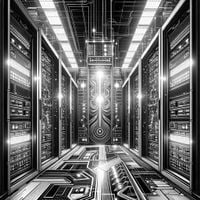The NVIDIA GTC conference currently taking place in San Jose, USA, from March 17 to March 21, 2025, is a beacon of innovation, showcasing advancements in artificial intelligence (AI) and cybersecurity. Among those making waves at the event is Siemens Energy, which is engaging in discussions about the latest achievements in AI applications for cybersecurity in collaboration with NVIDIA.
Siemens Energy has made remarkable strides in AI development over the past few years, particularly in addressing the increasing threat of cyberattacks targeting the energy sector. Their proprietary system, known as MDR (Managed Detection and Response), is designed to protect energy infrastructure by utilizing AI to detect threats in real-time. This system monitors both information technology (IT) and operational technology (OT) systems, which includes machinery and installations. With MDR, Siemens Energy aims to provide immediate response actions when a cyberattack is detected, thus minimizing or even preventing potential damages.
Additionally, Siemens has introduced SIEAERO, an AI-supported monitoring system for digital surveillance of power grids. By analyzing large datasets in real-time, SIEAERO quickly identifies issues such as technical faults or safety risks. This proactive approach helps prevent smaller disturbances or outages, enhancing the safety and efficiency of energy supply. The collaboration with NVIDIA is expected to further amplify these advances, placing AI at the forefront of bolstering security and efficiency within the energy industry.
On a parallel track, NVIDIA's CEO, Jensen Huang, is underscoring the potent demand for AI technologies during his keynote addresses at the GTC conference. He has indicated that the initial expectations regarding the expansion of AI capacities might be too conservative and called attention to significant investments in quantum computing and semiconductor manufacturing in the U.S. Huang stated, "We know already that in a few years, AI infrastructure worth several hundred billion dollars will be built," emphasizing the urgency and scale of future investments.
In addition to discussing AI applications, NVIDIA is also pushing ahead with plans to construct the NVIDIA Accelerated Quantum Research Center (NVAQC) in Boston. This new facility aims to integrate cutting-edge quantum hardware with AI supercomputers, paving the way for what Huang calls "accelerated quantum supercomputing." The center will focus on solving critical challenges like qubit noise and transforming experimental quantum processors into practical systems, bolstering advancements across various fields, including pharmaceuticals and materials science.
A substantial portion of NVIDIA's investment—up to half a trillion dollars—will be dedicated to enhancing semiconductor production within the United States. This strategic move reflects the company’s commitment to reducing reliance on foreign supply chains, aligning with broader economic policies aiming at domestic manufacturing growth. Huang’s company has already partnered with leading cloud service providers, procuring 3.6 million Blackwell GPUs, signifying a robust commitment to meeting the surging demand in AI and machine learning infrastructure.
Despite the excitement surrounding these innovations, the announcement of the new chips by NVIDIA has resulted in fluctuations in the company's stock price. Analysts have pointed out that while the introduction of new technologies is crucial, it often involves significant up-front investment costs, potentially impacting profit margins in the short term. These factors may also contribute to market hesitations as investors weigh the anticipated benefits against current costs.
With adversaries like AMD and Intel also pushing into AI chip development, NVIDIA is keen on maintaining its market lead. As Huang noted, the competition remains fierce; thus, ensuring the security of AI systems is paramount as they face increasing deployment in critical applications. NVIDIA’s upcoming chips are expected to incorporate improved security features to address these growing demands.
The landscape for AI-driven technology is rapidly evolving, necessitating continuous innovation and adaptation. NVIDIA and Siemens Energy are at the forefront of this shift, each leveraging AI to address complex challenges within their sectors. The synergy between advancements in AI and quantum computing could hold the key to not only enhancing operational efficiencies but also unlocking new possibilities for growth and development across industries.
As these companies forge ahead, the future of AI chip development looks promising, and with the integration of technologies like the Internet of Things and autonomous systems, the demand for high-performance processors is set to escalate. With the stakes high, both NVIDIA and Siemens Energy will need to meet investor expectations while driving technological advancements that can pave the way for a sustainable, secure, and efficient future.



